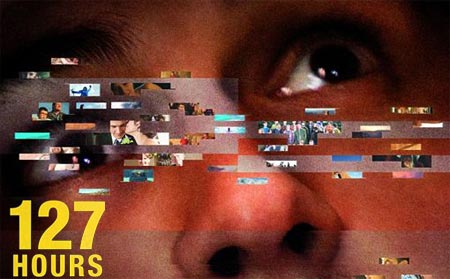127 Hours: B+
Full disclosure: I walked out during the climactic scene when the combination of electro-shock therapy sound effects and grimy, feverish camera movements almost made me faint. When I got to the lobby, all I saw were black spots flashing everywhere. I had to lean against the concession counter for a couple of minutes and focus on breathing before the nausea subsided and I could see clearly.
For a film that climaxes with a man methodically sawing off his own arm, 127 Hours startles as much for its rich humanity as it does the grotesque nature of self-amputation. Putting aside for now this act of horrific self-preservation, 127 Hours does nothing so much as emphasize the thrill of being alive, the little acts individuals embark upon to find a personal freedom, and the self-awareness that Maya Angela immortalized: "That nobody, But nobody, Can make it out here alone."
Director Danny Boyle follows up his Oscar-winning Slumdog Millionaire with an entirely different type of survival story. He sacrifices the narrative expansiveness of his prior film and replaces it with a single-minded relentlessness that focuses on one major character: outdoorsman Aron Ralston (James Franco), who in 2003 found himself trapped by a boulder in a gorge and swallowed by the wild of Blue John Canyon, Utah. The film's blunt title sums up nicely the length of time he remained trapped before he chose to become famous instead of dead.
While I haven't seen many of Boyle's earlier work in years, those films led him to this material if you're painting in rather broad strokes. The sense of physical/spiritual confinement, the lethality of mental deterioration during stressful situations, the willingness to shun humanity, the human spirit's indomitable will to persevere - all are represented in various ways in Boyle's previous films whether it be David's retreat from reality in Shallow Grave to Renton's struggles in Trainspotting all the way through to Jamal and Latika's intense longing for the other in Slumdog. Now, in 127 Hours, Boyle is able to focus on these various thematic elements while in the process he's whittled away extraneous baggage and sharpened his focus on a singular individual stuck for the majority of the film in one, solitary spot.
Fortunately, Boyle has always been director known for visual panache and he uses all of his considerable skills to keep the story from becoming lifeless. He's aided by two talented cinematographers, Anthony Dod Mantle and Enrique Chediak; a tremendous editor, Jon Harris; and a committed performance by James Franco. You know you're in good hands when a film shows its' main character literally stuck in one place and yet your attention is held. That's solid film-making. Granted, Boyle does make judicious use of hallucinations and flashbacks, but the majority of screen time is devoted to Ralston's conflict in the canyon.
Franco doesn't overplay the role. He lets you understand right at the beginning of the film that Ralston loves life, especially the thrill of escaping into the vast wilderness of Utah's peaks and canyons. He's a personable, confident, and self-deprecating individual, evident when he meets two fellow, attractive hikers played by Amber Tamblin and Kate Mara. But Ralston also prefers to be alone; he seems to enjoy the company of others, but he enjoys flying solo better. This lack of connectivity to others coupled with his daredevilish exploits promptly lands him stuck with no one to count on.
What would you have done? Could you severe your own arm with a dull blade? Could you snap your own bones to provide even the opportunity to saw it off? Could you slash through tendons while covered in your own blood? It's a remarkable story, and prior to this scene, Boyle and Franco allow us to understand Ralston's resiliency and thoughtfulness; he may be foolish, but he's not stupid, and it's a testament to the storytellers that when Ralston makes his remarkable decision, you understand even if you cannot comprehend.
By the story's end, you're also left with the spine-tingling joy of witnessing something truly amazing. 127 Hours is rooted, like Ralston, in simple, true joie de vivre. But it also tempers it's love by making it clear the world is too large, too wonderful, and too unpredictable to go it alone. What would have happened if Ralston had simply told his mother where he was going instead of ignoring her calls? What if he'd stayed with the two hikers he'd met and shared his love and knowledge of the outdoors with them for the day instead of carrying on by himself? The opening montage plays to Free Blood's "Never Hear Surf Music Again" and Boyle uses it to juxtapose the rat race and Ralston energetically preparing for his trek to the wilderness; sure, we don't want to just be drones shuttling from one place to another, indentured servants to the economics of world's work force and blind to the beauties inherent in the world. But, Boyle seems to suggest, we don't want to be spastically bouncing from one wonder to the next without the sort of communal transference that can lead to a sense of enlightened transcendence. To not share in the beauty the world has to offer, to want it only for ourselves to hoard, demonstrates not only selfishness, but a hubris that is bound to leave one spiritually adrift and alone. Ralston learned his lesson the hard way. May others be more fortunate.




Hey, can a brother get a "spoiler alert"? Damn, man.
ReplyDeleteJ/k. Great review, sounds like a great film. So... did you make it back inside the theater? You didn't miss any critical moments?
ReplyDeleteThe Angelou reference and pic of the real Ralston are nice touches. Nice work Mr Jude
No, I didn't miss any critical moments other than when he frees himself from the rock and escapes the canyon. Balls.
ReplyDelete